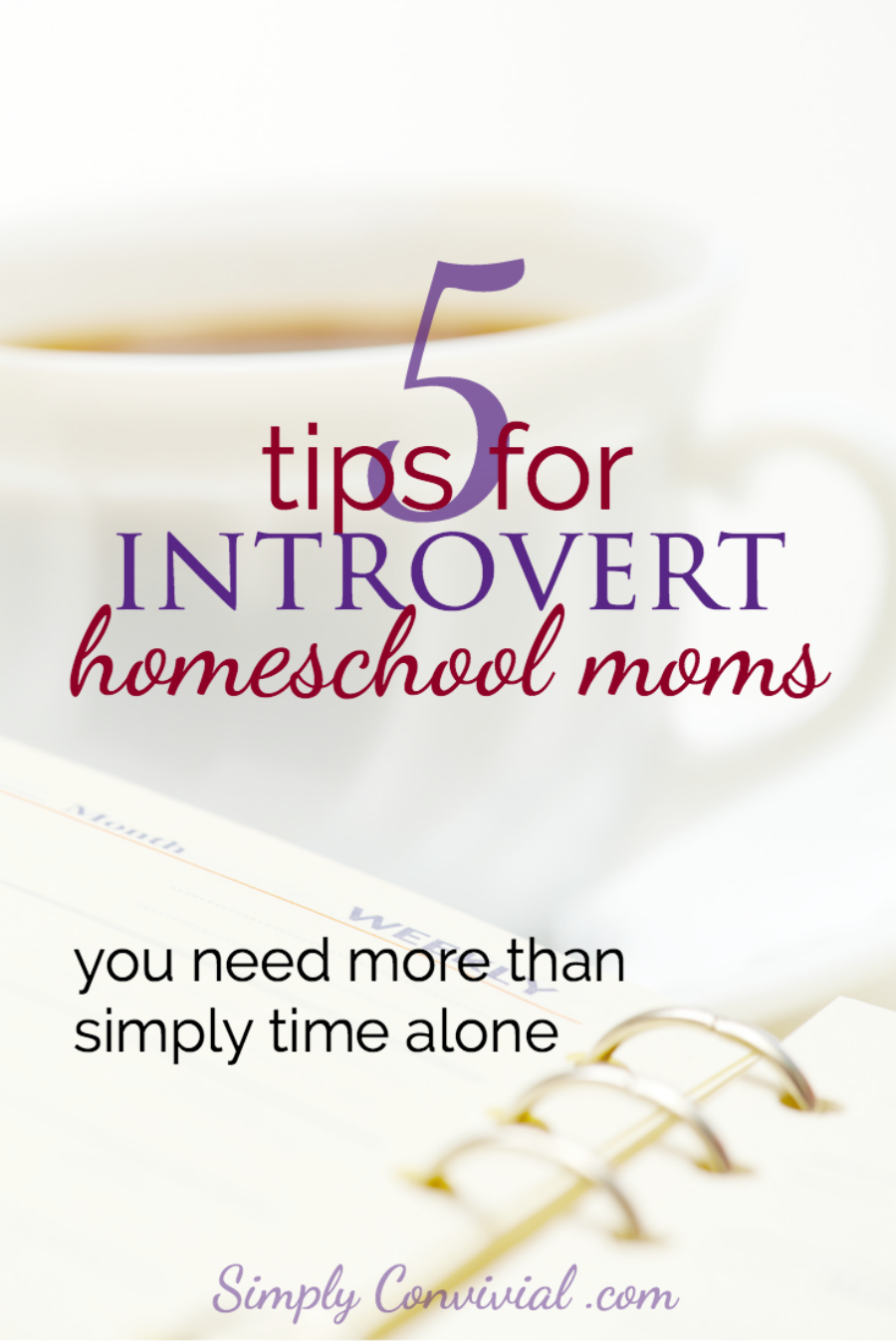Homeschooling is made for introverts.

So say the extroverts.
Sure, we get to stay home and keep our circle of influence strong and consolidated. In our day-to-day lives we don’t have to conform to a group or put on a show for others.
However, homeschooling means we are constantly at the beck and call of our children’s needs, being at the center of our bustling homes, and living a full and perhaps cluttered life. These aspects wear us introverts down.
But it is precisely because so much of ourselves is poured into our family that we must ensure we have something to pour. Giving takes energy, and introverts regain their energy in very specific ways.
The more we give ourselves the time and activities that build our energy back up, the better we’ll be able to tackle our daily duties with gusto.
So here are five ways we can ensure we’re giving and refilling, appropriately and meaningfully.
Listen to this post!
SC018: 5 Homeschool Tips for Introverts
1. Find the right kind of refill time.
It’s a mistake to assume that being an introvert means that all we need to refresh ourselves is peace and quiet. All quiet times are not created equal.
Simply being alone is not enough. You need to find activities that resonate with your primary introverted function.
For INFJs & INTJs, this is intuition; they will need uninterrupted thinking time – not simply reading or simply silence, but time to let ideas connect up in their minds.
For ISFJs & ISTJs, sensation is the primary function; they need time to build memories, to information that is meaningful to them, and to learn more details about their areas of interest or a hobby.
Feeling is the primary function for INFP & ISFP types; they will feel refreshed by experiencing a personal connection with nature, an idea, or a person. They look for ideas, experiences, and people to cherish.
INTPs and ISTPs enjoy improvising within an area of expertise, seeing their knowledge come out their fingertips by some kind of creative expression in a meaningful field.
2. Find a close friend to share the journey.
None of us can go it alone, not even introverts. Introverts need friends, too. In fact, they might need them more than extroverts.
Introverts open up and sometimes even act like extroverts when the external setting agrees with their internal position.
When we know another person both understands and cares, we come alive socially – and we all need that. Introverts must hunt for someone who “matches” their thought processes so they can share their best selves.
Just because we’re introverts does not mean we should try to do life alone. It is not good for the homeschooling mother to be alone. Find a conversation-meet, either in real life or online.
3. Reserve time to learn.
Our introverted function is the one that helps us learn and connect with information and experience. Because introvert’s dominant function is the introverted sort, introverts must ensure they reserve time to learn and think.
That doesn’t mean all introverts must read, but it does mean we will feel refreshed and alive when we find a topic, a hobby, a skill to study and gain proficiency in.
INFJs & INTJs need to ensure they have reading or listening time set aside in theoretical, idea-driven works that address deep and meaningful aspects of their life.
ISFJs & ISTJs will want to gather experiences or information that adds to their reserve of knowledge, prioritizing concrete data and details over theories and concepts.
INFPs & ISFPs need to immerse themselves in an experience, whether that’s a nature walk, a fantasy novel, a person-driven history account, or an expressive art.
INTPs and ISTPs enjoy learning through noticing and evaluating patterns from a multitude of inputs.
4. Develop your extroverted function.
Did you know introverts have to extrovert? Did you know it’s good for us to do so, not actually a necessary evil?
It’s true.
When introverts develop their secondary extroverted function, they’ll experience more meaningful, balanced growth. The extroverted function allows introverts to make use of their insights or gather better data for their learning.
INFPs and INTPs use extroverted intuition. This means they love to take in a multitude of inputs, seeing all their is to see, or reading all the books – but then they will narrow down all those sources to the unifying ideas that are most important to them.
ISFPs and ISTPs use extroverted sensing. This means they gather actual sensory information – details that are concrete, visible, tangible. They delight in first-hand, rapidly-changing engagement with the real world.
ISTJs and INTJs use extroverted thinking. This means that they make things happen in line with their carefully thought-out priorities. When they are in charge of a situation or a project, they are fully engaged with their secondary extroverted function.
ISFJs and INFJs use extroverted feeling. This means they are builders of traditions and relationships, fully functioning in their secondary mode when they are creating harmony and personal connections with others.

5. Plan in line with your executive mode.
The third letter in your type is your executive mode – it is how you make decisions. When you plan in line with your executive mode, you’ll be better able to work your plan and create a plan that reflects your actual priorities.
ISTJs & INTJs use the extroverted thinking mode to plan. They know their priorities and craft a plan that will accomplish their goals; with an extroverted thinker, it’s always business, not personal. However, because it is their secondary function, they have to stretch themselves to exercise this mode.
INTP & ISTP’s executive mode is their primary function: introverted thinking. Their logic is the right-brained counterpart to extroverted thinking’s left-brained expression: it is more instinctual and pattern-seeking than pattern-creating. They move forward from their inner goals, but more by feel and gut than by clear strategies. So, it is imperative for these types to keep their attention perpetually on their aims so their “play by ear” actions are rightly aligned.
ISFJ and INFJ’s executive mode is extroverted feeling; because it is their secondary function, they need to be careful to keep their actions aligned to their inner convictions rather than guided by outside pressure, which will be their temptation. If they develop their extroverted feeling, they will have the strength of mind and character to be a mentor, guide, counselor to any they take under their wings.
INFP and ISFP’s executive mode is introverted feeling, which is also their primary function. Sensing patterns and problem-solving by gut-instinct, they make the situation personal and adapt themselves accordingly. They execute through empathy and human-value rather than through systems or logic, often operating with a sense of quest or destiny they can’t express.
When you find yourself feeling weary and frayed, choose a method of refreshment that resonates with your personality type so you can effectively and efficiently prepare yourself for more service.
Don’t miss 5 Tips for the Extrovert Homeschool Mom!


So interesting, Mystie! You’ve given me (an INFP) a justification for the boatload of books I’m “currently” reading. ;) I’m mulling over what I’m doing right to refill and what might need to change…”
I’m always happy to help justify book addictions. ;)
Yours is the first blog I’ve ever read consistently and absolutely love every time. Maybe it’s our matching personality types or something else, but keep writing. It’s a blessing to this reader.
Aw, thanks, Melissa!
I think I am an ENFP, but I really can’t wrap my head around the categories and how they interact. Would that make sense? So these breakdowns are helpful, even if I haven’t fully grasped everything! I just keep seeing all the possibilities.
I think I’m pretty darn extroverted, but totally need certain kinds of time away, when I’m not doing well, I sort of manically engage with people when I don’t really have enough resources to do it well anymore. Introverted friends sometimes think that couldn’t happen to an extrovert, I think extroverts might need to be extra sure to get away, as we may not do it naturally. Does that make sense, or am I misunderstanding?
Thanks. Lots to chew on!
Sounds very ENFP. :) Next Monday I’ll have the counterpart article for extroverts! :)
I really enjoyed the article. I’m an INTJ, and I think you’ve done a good job nailing that one in particular. ;-) I do have one caveat, however. My strongest preference (percentage) is for iNtuition, so that can be a double-edged sword. I think you alluded to this kind of thing when you mentioned that INTJ types have to work to get into their executive logical-planning mode (or, in my experience, it’s more likely the follow through part of planning). But what I find tripping me up most of the time is my penchant for indulging my preference for N. So, while I certainly need the time to let ideas come together in my head, and I read voraciously in order to inform my curiosity, I can find those practices draining if I have indulged in them to the point of neglecting the things that I really should be doing. Because on the flip side I really have an addiction to getting things done and seeing progress made toward my goals–the rub is when I go so inside my head for so long that I neglect GTD and then my J becomes very upset with myself!!! In order to get myself out of my head, I sometimes have to get outside (the four walls of my home being a metaphor for living inside my head). Seeing what God has made and literally seeing depth in the world around me helps pull me out into the real world so that I can actually have the meaningful alone time you mentioned or re-engage with my kids or housework with clear vision.
I’m going to go out on a limb here and guess that you can relate?
Ok, so I’m rethinking this a bit and realizing that part of the need to get outside is also a response to over-stimulation–the noise from my two rambunctious boys, the many things that need to be done, and the excessive information I get from the internet. So stepping outside both gets me out of my head and calms my central nervous system so that I can think. LOL
You pretty much pegged me (INTJ). Even in the way I read all my copious amounts of books. I hadn’t thought of it that way.
This explains why I feel I need to work at home. Sewing while listening to Netflix or a fiction podcast recharges me and makes me less irritable around my family. I waffle between INFJ and ENFJ.
This was really helpful! Now I more clearly see why certain times in my life were more difficult or why certain times were more enjoyable! Also, why my husband and I have such a hard time coming up with date nights that are enjoyable to both of us… he is INTP and I am ISFP… so basically what is relaxing for him is too stimulating for me and what is relaxing for me is boring for him, :/ This will be a good talking point to come up with some better ideas. :)
I love this article, this has put into words the answers I have been looking for as I have tried to figure out how to balance home and work and hubby, son, more family, friends and coworkers with the introvert I am..INFJ..in a project management of engineering projects (stereotypically considered to be an extroverted role)…I am wondering how this would apply to working outside the home mamas…I recognize that is not what you talk about but maybe you have some ideas or can point me in that direction?
Wow! I’m an INFP and I found your suggestion for them to be most enlightening and helpful. I felt a big AHA! I’ve felt my down time wasn’t refilling me, so now I have some guidance on what to try next. Thanks you. :D